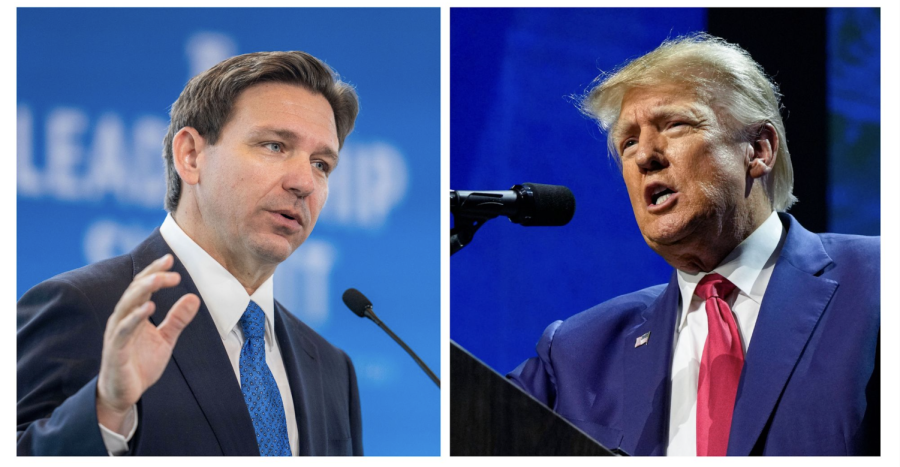2024 Watch: The Republican Field Takes Shape
We’ve officially entered campaign announcement season, and the picture for the 2024 Republican Presidential primary is becoming clearer. On April 11, Senator Tim Scott announced that he is forming an Exploratory Committee, the first formal step towards an official run. In an interview on CBS last week, former Vice President Mike Pence hinted that an announcement would come soon. Former Secretary of State Mike Pompeo passed on a bid during a Fox News interview earlier this month. And, as reported by New York Magazine this week, Governor Ron DeSantis’s campaign is widely expected to begin after the Florida Legislature’s session ends on May 5.
The dynamic in the race so far has been steady: Trump and DeSantis leading the way, and the rest of the field far behind. FiveThirtyEight’s most recent national polling average has Trump just below 50%, DeSantis just below 30% and the rest of the potential field polling in the single digits. Barring a major shift in the political landscape, it appears to be a two-man race for the nomination. In recent weeks, though, DeSantis’ stock has declined. President Trump received a bump in the polls after his Manhattan indictment galvanized many Republicans, and the pundit class has begun to ask if DeSantis has the interpersonal skills and charisma to mount a successful national campaign. DeSantis’ trek to Washington last week to fundraise and meet with Republican members of Congress, seemingly a prelude to a formal campaign announcement, was a swing and a miss. Just after meeting with DeSantis, nearly half of Florida’s Congressional delegation endorsed Trump. It’s an ominous sign that DeSantis’ political outreach in his own backyard so notably flopped, and it has rightly raised questions about his (and his staff’s) ability to do the basic political blocking and tackling. Florida Rep. Greg Steube, for example, told Politico recently that over his five years in Congress, DeSantis refused to engage with the Congressman even once, despite multiple entreaties. DeSantis must do the work to deliberately build a winning coalition—it won’t simply assemble itself for him. He’s already behind the 8-ball.
Despite the media narrative, though, DeSantis’ rough April shouldn’t cause excessive concern within his camp—or among his supporters. After all, he’s not yet even a declared candidate, and he has yet to explicitly pitch a Ron DeSantis presidency to voters. With major donors lining up behind his campaign, though, he’ll be able to blanket the airwaves once he does announce. And with his national political profile, he won’t struggle to break through the din of the campaign—the media will report on his every move. DeSantis has both the means and the time to bring voters to his side.
Even more, while it makes sense to consider the national landscape this early in the nominating process, voting in the early states will ultimately set the stage for the primary race. No matter where he stands in national polls, a DeSantis win in Iowa or New Hampshire would cement him as a serious alternative to Trump—and barring a breakout performance from anybody else, the only serious alternative. True, his talent (or lack thereof) for retail politics will matter in those small states, where the campaign takes candidates to diners and VFW Halls more than big stadiums or cushy fundraising banquets. But if he can pull out victories at the start of the primary season, the reverberations will be heard nationally.
And what about the rest of the field? At this point, it simply doesn’t seem like there’s much of an appetite among Republican voters for anybody but Trump or DeSantis. A breakout moment vaulting one of the others into the top tier of contenders is always possible—remember Kamala Harris’ attacks on Joe Biden at the first Democratic debate in June 2019 that put her briefly atop of the primary field. And the early-state filtering process could work to their advantage: in 2016, for example, Marco Rubio was ascendant after a strong third-place Iowa finish before Chris Christie all but ended his campaign on a New Hampshire debate stage.
But the rest of the pack is more likely to have an indirect impact than to be nominated themselves. The longer a large field stays in the race, the tougher it will be for DeSantis to consolidate the non-Trump vote and rack up delegates. And it’s worth asking: why are the also-rans running? Sure, each of them wants to be President. But for younger candidates like Nikki Haley and Tim Scott, the 2024 campaign is an opportunity for them to increase their name ID, build out a donor list ahead of a future contest, and maybe even earn a spot on the ticket as Vice President. These candidates are simply less likely to risk their future by making bold moves and breaking glass—the things they’d need to do to break out of the pack. So, for now, it’s a two-man race.




